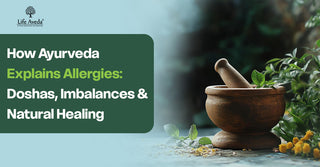Psoriasis is not just a skin problem—it's an autoimmune disease that needs to be healed from the inside out. While conventional medicine focuses on symptoms, Ayurveda deals with the main causes, cleansing the body, and reestablishing equilibrium. Ayurveda offers natural ways to manage psoriasis through herbal remedies, dietary modifications, and lifestyle changes that promote clearer and healthier skin. In this blog, we’ll explore causes, symptoms, types, and an Ayurvedic perspective on psoriasis. Also, we’ll provide 6 Ayurvedic tips for psoriasis, along with the best Ayurvedic Solution for Psoriasis.
Understanding Psoriasis: Causes, Symptoms, and Types
Psoriasis is a long-term skin condition that accelerates the cell renewal cycle of the skin, resulting in red, scaly patches, itching, and discomfort. It is an autoimmune disease in which the immune system mistakenly attacks healthy skin cells, resulting in cell overproduction at a rapid rate.
Main Causes of Psoriasis
- Imbalanced immune system: An overactive immune response leads to excessive skin cell growth and inflammation.
- Genetics: If psoriasis runs in the family, you’re more likely to develop it.
- Environmental Triggers: Stress, cold temperatures, infections, or skin trauma may trigger flare-ups.
- Poor diet and lifestyle: Smoking, alcohol, and junk food may aggravate psoriasis.
- Poor digestion: A compromised digestive system causes toxin accumulation, making skin problems worse.
Types of Psoriasis
Psoriasis occurs in a wide variety of forms, with each having different characteristics and precipitating factors. Having an awareness of these forms helps to ensure improved psoriasis management.

- Plaque Psoriasis: This is the most common type, where the skin appears covered with thick, red plaques topped with silvery-white scales. Plaques tend to appear on the scalp, elbows, knees, and lower back and are sensitive and pruritic.
- Guttate Psoriasis: These are small, red, drop-like lesions, which develop quite suddenly following an infection, either viral or bacterial, like strep throat. It usually develops on the trunk, arms, and legs and in children and teenagers.
- Inverse Psoriasis: Unlike plaque psoriasis, it is described as glabrous, shiny, vivid red lesions in skin folds such as in the armpit, under the breasts, and groin. It is aggravated by sweating and friction.
- Pustular Psoriasis: A more extreme version of white, pus-filled blisters with red, inflamed skin around them. These painful pustules may be local (on hands and feet) or widespread on the body, often with fever and chills.
- Erythrodermic Psoriasis: The most severe and rarest type, leading to large areas of redness, peeling, gross inflammation, and burning. It can lead to complications like dehydration and infection and requires urgent doctor consultation.
Ayurveda’s Perspective on Psoriasis: The Dosha Imbalance
Ayurveda views psoriasis as a result of derangement in the equilibrium of Vata and Pitta doshas, together with toxin accumulation.
- Vata imbalance causes dryness, roughness, and scales.
- Pitta imbalance leads to redness, burning, and inflammation.
- Toxin buildup in the blood further aggravates the skin problems.
How Ayurveda Heals Psoriasis
- Panchakarma: For detoxification of toxins and balancing dosha.
- Herbal Remedies: To cleanse blood and heal skin naturally.
- Dietary & Lifestyle Changes: To avoid further toxin buildup.
6 Ayurvedic Tips for Psoriasis

1. Detoxify Your Body
Detoxification is an important process in the management of psoriasis because Ayurveda suggests that toxin buildup in the blood worsens skin diseases. Panchakarma therapy, an Ayurvedic cleansing technique dating back thousands of years, eliminates toxins and restores the natural balance of the body.
- Virechana: An Ayurvedic cleansing method that entails eliminating toxins from the blood and liver to prevent inflammation and over-production of cells responsible for psoriasis eruptions.
- Abhyanga: Daily skin massage with oil medicaments like coconut or Karanja oil stimulates blood circulation, deeply moisturizes the skin, and corrects dryness and scales. The practice keeps Vata dosha in balance, which tends to trigger psoriasis.
- Triphala Powder: Triphala is a herbal colon cleanser that promotes gut health, so toxins can be effectively eliminated rather than stored in the body, leading to skin issues. It contains Haritaki and Bibhitaki, which help digestion and detoxification.
Ayurvedic detoxification removes stored toxins, purifies the blood, helps digestion, and manages psoriasis naturally.
2. Follow a Psoriasis-Friendly Ayurvedic Diet
Diet plays a key role in the management of psoriasis because certain foods can trigger or soothe the disease. Psoriasis is associated with the imbalance of Pitta and Vata doshas in Ayurveda, and dietary modification can be employed to soothe the doshas.
- Avoid trigger foods: Hot, sour, fried, and processed foods can lead to inflammation and toxin accumulation, resulting in worse psoriasis symptoms. Also, fermented foods, excessive dairy products, and nightshade vegetables (tomatoes, eggplant, and potatoes) must be avoided.
- Eat food with cooling properties: Adding bitter greens (such as neem leaves), fresh fruits, ghee, and whole grains soothes irritated skin and cleanses the blood.
- Hydrate with herbal teas and buttermilk: Herbal teas infused with turmeric or Manjistha, buttermilk, and warm water improve digestion, remove toxins, and enhance immunity.
Psoriasis-friendly diets of cooling and detoxifying foods and herbal beverages can potentially minimize inflammation and enhance skin health.
3. Use Ayurvedic Herbs & Oils for Skin Healing
Ayurveda provides a range of powerful herbs and natural oils that hydrate the skin, suppress inflammation, and facilitate healing. These herbs work synergistically to reduce psoriatic symptoms.
- Neem: It is a known powerful blood purifier and antibacterial drug. Neem decreases skin infections, itchiness, and scaling. It is also an antifungal and immunostimulant and is a must-have herb for managing psoriasis.
- Manjistha: Manjistha is a natural skin rejuvenator. It enhances blood circulation, lightens pigmentation, and eliminates toxins, keeping the skin healthy and radiant.
- Turmeric: This anti-inflammatory and immunomodulating plant decreases swelling, redness, irritation, and inflammation produced by psoriasis. Its active constituent, curcumin, blocks inflammatory pathways but permits healing of the skin.
-
Oils for topical relief:
- Coconut oil also moisturizes and soothes irritated skin deeply.
- Karanja oil is a natural antifungal and antibacterial substance suitable for psoriatic skin.
- Castor oil encourages detoxing and prompts scaly, dry areas to remove themselves.
4. Sunlight Therapy for Natural Healing
Vitamin D, produced when exposed to sunlight, controls the immune response and calms the symptoms of psoriasis. A 15-20 minute walk in moderate sunlight each day can halt the overproduction of skin cells, a leading cause of psoriasis.
- Optimal sun time: Early morning sun (before 10 AM) is best and safest.
- Precautions: Do not overexpose, as sun exposure in excess will dry up the skin and cause inflammation.
- Avoid harsh soaps and chemicals: Gentle, herb-based skin care creams prevent irritation while preserving natural moisture.
Regular sun exposure, combined with chemical-free skin care, regulates psoriasis symptoms and smoothens the skin.
5. Manage Stress with Yoga and Meditation
Psoriasis is closely associated with stress, and increased stress can cause exacerbations and worsen the disease. Ayurveda aims for mental health as the priority to be healthy as a whole. Yoga, meditation, and pranayama (control of breathing) balance stress hormones and doshas, further improving skin health.
- Yoga Poses to Relieve Psoriasis: Child pose and forward bend can calm the nervous system and enhance blood circulation. The cobra pose can be done to help digestion and purification, which is required to prevent psoriasis.
- Pranayama: Pranayama, such as Anulom Vilom and Bhramari, must be practiced to balance energy channels, repress stress and anxiety, and maintain overall health.
A calm mind is a sign of healthier skin—yoga, pranayama, and meditation can subdue psoriasis attacks to a great extent.
6. Adopt a Daily Ayurvedic Routine
Following a daily Ayurvedic routine (Dinacharya) improves digestion, cleansing, and complexion. Psoriasis can be managed only with lifestyle practices being adhered to daily to prevent flare-ups.
- Morning Routine: Wake up early to align with nature and drink warm water with turmeric or Triphala to cleanse. Oil pulling is also recommended to eliminate toxins and have a healthy gut.
- Timely Meal Schedule: Eating meals at the usual times promotes digestion and prevents toxin buildup.
- Healthy Sleep Routine: Get 7-8 hours of quality sleep for rejuvenation and repairing of skin.
Compliance with an Ayurvedic regimen of a balanced diet, water intake, and rest is a firm foundation for psoriasis-free skin.
Life Aveda’s Holistic Approach for Psoriasis
Life Aveda addresses psoriasis from an entire Ayurvedic perspective by focusing on the causative factor of the condition instead of the symptoms. It is managed with detoxification and inner cleansing to eliminate accumulated toxins in the body, which have been scientifically proven to trigger psoriasis symptoms. Ayurveda also concentrates on dosha balancing of Vata, Pitta, and Kapha to restore equilibrium and promote overall wellness. By enhancing digestion and immunity, Life Aveda's approach makes the body strong enough to fight and manage psoriasis without any medication.
Feel the difference with Life Aveda's Psoriasyo Capsules
Life Aveda's Psoriasyo capsules contain strong Ayurvedic herbs that are known to work in harmony to give the skin a healthy, clear appearance and detoxify the entire body of toxins. These capsules are encapsulated with potent herbs, including neem, manjistha, pitpapda, kutki, haritaki, bibhitaki, chakramarda, and shirish. These may help to cleanse the blood, detoxify the liver, enhance digestion, and suppress skin inflammation, and hence can be used as a natural, effective approach for psoriasis. These capsules are side-effect-free, Ayurveda-nurtured, and a safe, efficient means to manage psoriasis.
Conclusion
Psoriasis is a long-term condition, but Ayurveda provides a very effective, long-term solution by improving the body from the inside. With the combination of herbal therapy, dietary changes, detoxification therapies, and stress management methods, you can effectively manage psoriasis and achieve healthier skin. Ayurveda not only targets the symptoms but also enhances your immunity level overall, making the condition less likely to recur.
Take the first step towards smoother skin! Get natural relief for the skin with Life Aveda's Psoriasyo capsules. If you desire a customized approach, you can consult our Ayurvedic experts today!



